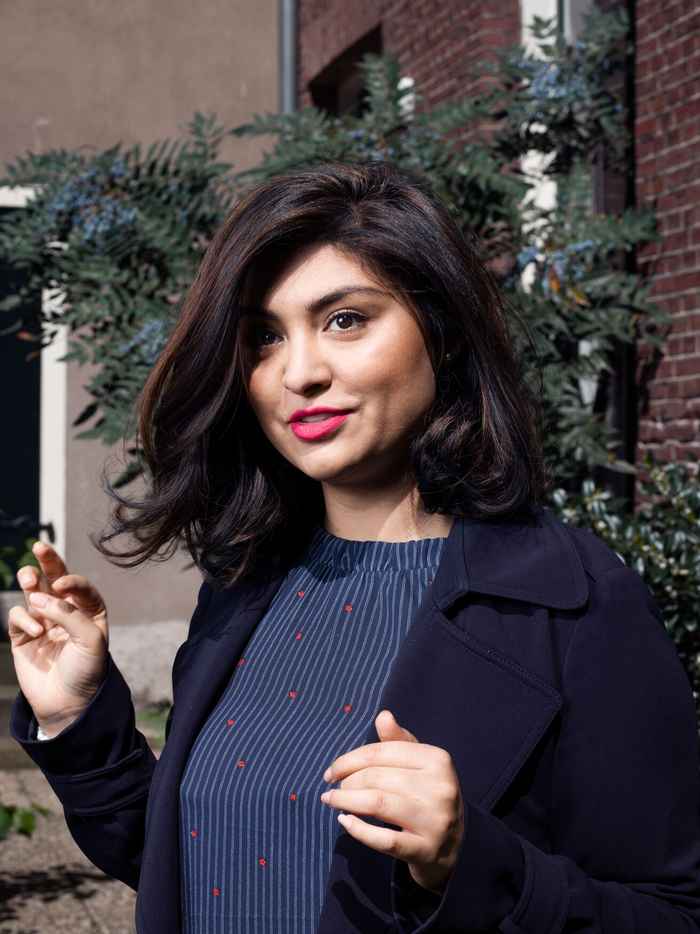Sujet Shams

Who: Sujet Shams (1991)
Studied: European Studies and Philosophy
First job: Dishwasher at a Chinese restaurant
Favourite place at the UvA: The Bushuis; it’s a beautiful listed building
Essential: Good contacts with fellow students. You learn more from discussions with them than you would from just reading books.
Sujet Shams (1991) is a European Studies Bachelor's student with a minor in Philosophy. Sujet was born in Afghanistan and comes from a highly-educated family. As a child, out of necessity, she spent four years in Dutch asylum seekers’ centres. The rest of her youth was spent in the Dutch ‘Bible Belt’. She chose the European Studies programme because of its sociocultural aspect. As if that weren't enough, she is also taking nearly enough courses to earn a second Bachelor's in Philosophy. And in between, Sujet served as a committee chair for the Central Student Council (CSR) as well. Although her family would have preferred to see her become a doctor or engineer, when she graduates, she wants to write, earn a doctorate or teach.
Are you glad you chose European Studies?
‘Definitely. One of the reasons I picked European Studies was that, to me, Europe was the foreign continent my family and I somehow ended up on. In addition to the sociocultural aspect, I found the fact that it was an interdisciplinary programme appealing as well. Because I felt that I'd want to go abroad at some point, I chose the programme taught in English. What makes European Studies so great is the diverse range of courses and tracks to choose from within the programme. In the first year, you learn a bit of everything and from the second year on, you begin to specialise. At that point, you can choose from five tracks: Culture and Literature, European Law, European Economics, European History and Eastern European Studies. I chose European Economics, but also took a few of the European History courses. Because the degree programme is fairly broad, it's good to supplement it with a minor in a field you enjoy and in which you'd like to pursue a Master's. I chose Philosophy.’
Language is incredibly important: it offers insight into a specific version of reality.
A minor in Philosophy, too! Were you eager for even more knowledge?
‘I had previously considered enrolling in the Philosophy programme. The course in Philosophy of Science was a turning point: I found it so interesting that I decided to do an extensive minor in Philosophy as a way to prepare for a philosophy-related Master's programme. While you might expect otherwise, Philosophy is actually quite a precisely structured programme. Where freedom of rhetoric and thinking are concerned, philosophy is a true sanctuary – the act of thinking obviously defies the establishment of any strict rules. And yet the texts written by philosophers are incredibly well-organised. I have learned the difference between practical and theoretical philosophy. Theoretical philosophy deals with logic and rhetoric; it is more mathematical and technical than practical philosophy, which focuses more on politics and society. European Studies, for its part, is a political programme that obviously also concerns society to a large extent. It aligns surprisingly well with Philosophy. While the link to society is important to me, I also really like the structure because of my natural tendency to be a bit disorganised. Unlike many people in my family, I didn't choose to study medicine or law, but to earn a degree in the Humanities instead. But hey – they're used to me doing what I want. In my opinion, the Humanities can really expand your thinking.’
The UvA is a progressive university, especially when it comes to diversity.
You've become an advocate for the Dutch language. Why is that?
‘Last year, I served a twelve-month term as the chair of the Research and Education committee of the Central Student Council (CSR). My main focus was the shift toward teaching in English, an interesting development that also has me a little worried. While I fully support internationalisation, we must be wary of using it as the default – and only – reason for offering education in English. Language is incredibly important: it offers insight into a specific version of reality. We must treat it with the respect it deserves. That is why I'm acting as initiator of a proposal calling for the establishment of a large-scale online Dutch language course for international students. Having it online will facilitate access to the language course, which many students still see as too expensive and too time-consuming. After all, wouldn't it be a good thing if our international students were able to speak a little bit of Dutch after four years in the Netherlands? It's rather funny, when you think about it: I'm from Afghanistan, I speak Farsi and I advocate for the Dutch language. Who would have thought?’
The Humanities can expand your thinking.
Is there enough diversity at the UvA?
‘Yes, I think so. I'm glad I decided to enrol at the UvA. I love this university. To me, it is a progressive university, especially when it comes to diversity. People aren't aware of it, but fifty per cent of the students here are first-generation students. First-generation students are students whose parents did not attend higher education. Many people come from outside Amsterdam or the Randstad metropolitan area. In many ways, I feel that the word “diversity” is still being too narrowly defined: it is often used to refer exclusively to ethnicity or gender. Yet for people from the Bible Belt, for example, or others whose parents didn't attend university, the university is a completely unknown world.